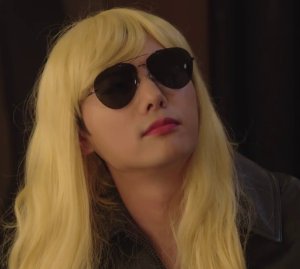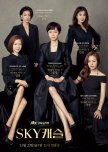I had avoided this drama because I feared that 20 episodes on the same theme would be heavy to digest and that, despite the satire, it would not be able to avoid boring and draggy moments. But since the drama was praised both in SK and abroad, as well as having also won prizes, I decided to give it a chance. Obviously once again I should have followed my instincts, I know myself too well, after years in dramaland, I know that some kdramas are not able to entertain for so many hours without falling into clichés and repetitiveness.
A group of rich families live in a high-class residential neighborhood called "Sky Castle". Wives manage homes and children while husbands work as important surgeons in the same hospital. Their biggest concern is to ensure that their children excel at school and the ultimate goal of their life is to have them admitted to the most prestigious universities SK. Once again a South Korean drama that talks about the pressing SK school and working system.
So what makes it different from the others, so much to have won so many awards?
There are three strong elements of this drama: satire, mystery and acting.
The lives of these families are shaken up by a tragic unexpected event, shrouded in mystery, this event will immediately capture the viewer's attention. Because of this event, a new family moves into the neighborhood, a family that lives more modestly. This creates new complex relationships and compares life and priorities between high-class people and common people.
The first part of the drama is divinely written, the daily life of these families intertwines with each other and is told to us in a perfect way with a mix of tragic and satirical, the characters are many and complex, often contradictory. The viewer will often find himself hating some characters, and then sympathize with them a few seconds later and laugh with them a few minutes later. Perfect acting certainly helps this variety of emotions.
Why I am piss then? Simple, the initial mystery dissolves immediately, the characters don't learn anything from what happened and they continue undeterred to hammer their children by dumping on them all their dreams and unrealized ambitions. The topic has been widely discussed and after 9 episodes the story has nothing more to tell about it, too bad that the drama lasts 20 episodes. Therefore it needs fillers, which arrive in the form of makjang, secrets of birth, bad mother-in-law, school tutors who hide secrets and trope related to the classic power struggle in the workplace (hospital).
Satire and acting are not enough to make up for a plot that has turned into lazy writing. Seeing a well written plot expire in the usual clichés has been frustrating and depressing. In addition I didn't appreciate at all a few sub-plots, in particular all the drama created by the neighborhood, when one of them wanted to write a novel, about the mystery that happened. Useless and roughly managed sub-plots.
Nothing to say about the cast, good work. Excellent idea but overall they have not been able to dare, offering less episodes but all dedicated to the characters and the consequences that the pressing South Korean society has on people and families. Avoiding all the trope and clichés.
Honestly speaking, I have too many dramas to watch in order to waste my time with the same trope.
From episode 10 I skipped a lot the clichè parts. At the end the drama had finally shown some characters development and the evil turn out to be who I initially tought.
Overall, between all drama that dealt with this topic and between all makjang, I can't deny that this is one of the best written, acted and executed. But I also can't deny that the drama lost his charm along the way.
A group of rich families live in a high-class residential neighborhood called "Sky Castle". Wives manage homes and children while husbands work as important surgeons in the same hospital. Their biggest concern is to ensure that their children excel at school and the ultimate goal of their life is to have them admitted to the most prestigious universities SK. Once again a South Korean drama that talks about the pressing SK school and working system.
So what makes it different from the others, so much to have won so many awards?
There are three strong elements of this drama: satire, mystery and acting.
The lives of these families are shaken up by a tragic unexpected event, shrouded in mystery, this event will immediately capture the viewer's attention. Because of this event, a new family moves into the neighborhood, a family that lives more modestly. This creates new complex relationships and compares life and priorities between high-class people and common people.
The first part of the drama is divinely written, the daily life of these families intertwines with each other and is told to us in a perfect way with a mix of tragic and satirical, the characters are many and complex, often contradictory. The viewer will often find himself hating some characters, and then sympathize with them a few seconds later and laugh with them a few minutes later. Perfect acting certainly helps this variety of emotions.
Why I am piss then? Simple, the initial mystery dissolves immediately, the characters don't learn anything from what happened and they continue undeterred to hammer their children by dumping on them all their dreams and unrealized ambitions. The topic has been widely discussed and after 9 episodes the story has nothing more to tell about it, too bad that the drama lasts 20 episodes. Therefore it needs fillers, which arrive in the form of makjang, secrets of birth, bad mother-in-law, school tutors who hide secrets and trope related to the classic power struggle in the workplace (hospital).
Satire and acting are not enough to make up for a plot that has turned into lazy writing. Seeing a well written plot expire in the usual clichés has been frustrating and depressing. In addition I didn't appreciate at all a few sub-plots, in particular all the drama created by the neighborhood, when one of them wanted to write a novel, about the mystery that happened. Useless and roughly managed sub-plots.
Nothing to say about the cast, good work. Excellent idea but overall they have not been able to dare, offering less episodes but all dedicated to the characters and the consequences that the pressing South Korean society has on people and families. Avoiding all the trope and clichés.
Honestly speaking, I have too many dramas to watch in order to waste my time with the same trope.
From episode 10 I skipped a lot the clichè parts. At the end the drama had finally shown some characters development and the evil turn out to be who I initially tought.
Overall, between all drama that dealt with this topic and between all makjang, I can't deny that this is one of the best written, acted and executed. But I also can't deny that the drama lost his charm along the way.
Vond je deze recentie nuttig?


 12
12 33
33 4
4























